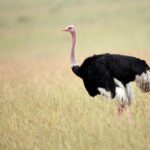Bearded dragons have surged in popularity as pets, celebrated for their docile nature and engaging personalities. If you’re considering welcoming one of these fascinating reptiles into your home, understanding their life expectancy is essential, alongside ensuring your household is the right environment for them. Generally, pet bearded dragons have a lifespan of around 8 to 12 years with optimal care, though some individuals may live longer.
The cornerstone of a long and healthy life for your bearded dragon is proper husbandry. This encompasses all aspects of their care, from nutrition and lighting to temperature control and regular veterinary check-ups. Mastering these elements is key to maximizing your beardie’s lifespan and quality of life.
Understanding the Average Bearded Dragon Lifespan and Aging
Native to central Australia, wild bearded dragons are now protected from export. Therefore, all bearded dragons found as pets today are bred in captivity. In their natural habitat, these reptiles face numerous threats, including predators and the inconsistencies of food, water, and healthcare, resulting in a significantly shorter lifespan compared to their captive counterparts. Wild bearded dragons typically live only a fraction of the 8-12 years commonly seen in pets.
Bearded dragons reach sexual maturity relatively quickly, usually between 1 and 2 years of age, and sometimes as early as 6 months. During the cooler months, many bearded dragons will undergo brumation, a hibernation-like state. Female bearded dragons are capable of laying eggs multiple times a year, often triggered by the temperature increase following brumation. A clutch can contain up to 20 eggs. Interestingly, females will lay unfertilized eggs even without the presence of a male. Fertilized eggs will typically hatch after an incubation period of 55 to 75 days.
Factors That Influence a Bearded Dragon’s Lifespan
While genetics can play a role, the majority of health issues affecting a bearded dragon’s lifespan are directly linked to their care environment and husbandry practices.
Husbandry Practices: Inadequate husbandry is the primary culprit behind many health problems in bearded dragons. Metabolic bone disease (MBD) and kidney disease are alarmingly common, often stemming from insufficient UVB lighting and calcium deficiency. These conditions can severely compromise their health and shorten their lifespan.
Genetics and Breeding: Inbreeding within bearded dragon populations is a significant concern. It can lead to various genetic disorders, physical malformations, and deformities, impacting their overall health and longevity. Silkback bearded dragons, a morph selectively bred for their smooth scales, are particularly prone to skin problems due to this genetic manipulation, which can negatively affect their quality of life and lifespan.
Reproductive Health in Females: Female bearded dragons are susceptible to egg-binding (dystocia) if husbandry is not optimal. This can occur when they fail to properly lay eggs, leading to retained follicles that can rupture internally, a life-threatening condition.
Dental and General Health: Periodontal disease, or gum and tooth disease, is another prevalent issue in bearded dragons. Regular veterinary checkups are crucial for monitoring dental health and providing timely intervention to prevent more serious complications. Quarantine for new reptiles is also vital to prevent the spread of diseases. Always quarantine new arrivals and have them examined by a veterinarian before introducing them to existing pets. Bearded dragons are generally solitary creatures and overcrowding can result in injuries and stress, potentially leading to infections and other health problems.
Hydration and Shedding: Proper hydration is essential for healthy shedding. Inadequate bathing and water intake can lead to dehydration and shedding difficulties. Constricted sheds, particularly around toes and tails, can cause loss of limbs if not addressed.
Obesity: Obesity is a common concern due to overfeeding and lack of exercise. An overweight bearded dragon is at higher risk of developing various health conditions that can shorten their lifespan. Consult with your veterinarian to determine a healthy weight and appropriate diet for your beardie.
To maximize your bearded dragon’s potential lifespan, discuss the following essential husbandry aspects with your veterinarian:
- Proper Lighting: Ensure appropriate levels of ultraviolet (UVB) and heat lamps.
- Temperature Gradient: Maintain correct temperatures, including a basking spot, and monitor humidity.
- Appropriate Diet: Offer a daily diet of leafy greens and a variety of vegetables.
- Insect Diet: Provide gut-loaded and calcium-dusted insects such as dubia roaches, superworms, and crickets.
- Terrarium Size: House your bearded dragon in an appropriately sized terrarium.
- Supplementation: Use proper calcium and multivitamin supplements.
- Water Access: Ensure constant access to fresh water.
Enhancing Your Bearded Dragon’s Lifespan
You can significantly contribute to your bearded dragon’s health, happiness, and longevity by implementing several key care practices. Always seek advice from your veterinarian, but general best practices include:
- Regular Veterinary Exams: Schedule annual veterinary check-ups, at a minimum.
- Routine Health Tests: Conduct regular bloodwork and yearly fecal parasite testing as recommended by your vet.
- Quarantine New Reptiles: Quarantine all new reptiles for 3-6 months and perform necessary testing based on veterinary advice before introducing them to other animals.
- Optimal Terrarium Lighting: Ensure proper terrarium lighting, maintaining appropriate temperature gradients, humidity levels, and accessible UVB lighting.
- Avoid Heat Mats: Never use floor or heat mats, as they pose a risk of thermal burns.
- Proper Feeding Schedules: Follow appropriate feeding schedules based on your bearded dragon’s life stage to prevent overfeeding and obesity.
- Fresh and Nutritious Food: Feed only fresh vegetables and live, healthy insects. Avoid dehydrated insects as they lack nutritional value.
- Supplementation: Regularly supplement your bearded dragon’s diet with calcium and multivitamins.
- Regular Health Checks: Frequently examine your bearded dragon for any abnormalities or signs of illness.
- Solitary Housing: Unless breeding, house bearded dragons individually to prevent stress and injury.
- Spacious Terrariums: Keep bearded dragons in large terrariums, ideally at least 2-3 times their nose-to-tail length.
- UVB Bulb Replacement: Replace UVB bulbs every 6 months, even if they are still emitting visible light, as their UVB output diminishes over time.
By providing diligent care and attention to these husbandry details, you can significantly enhance your bearded dragon’s lifespan, ensuring many happy and healthy years together.

